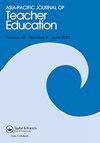Formative performance assessment in preservice teacher education – working through the black boxes
IF 1.6
3区 教育学
Q2 EDUCATION & EDUCATIONAL RESEARCH
引用次数: 0
Abstract
ABSTRACT Teaching performance assessments (TPA) are a trending feature of initial teacher education. Founded in the United States of America, TPAs have emerged in the Australian context as a capstone assessment of preservice teacher competence. However, the inclusion of the TPA in initial teacher education places additional pressure on tertiary institutions to prepare their graduates for the rigour of the test alongside the rigour of the classroom. This paper examines the ways in which preservice teachers may best be prepared for both the test and the teaching profession, exploring notions of the TPA and teacher quality, and the tensions between theory and practice. It does so in the context of part-time and distance initial teacher education, where the gap between university and the classroom, theory and practice is magnified. PrExConnex is introduced as one way in which preservice teachers can be appropriately scaffolded in learning how to negotiate the TPA during professional experience, whilst also being supported in becoming professionals, engaging in professional dialogue and reflective practice. Here, we leverage the metaphor of the classroom as a “black box;” the complex space in which connections occur between teacher and school inputs and student educational output.职前教师教育中的形成性绩效评估——通过黑匣子进行
教学绩效评估(TPA)是初级教师教育的一个趋势性特征。TPA成立于美利坚合众国,在澳大利亚已成为职前教师能力评估的顶点。然而,将TPA纳入初级教师教育给高等教育机构带来了额外的压力,要求它们的毕业生在面对严格的考试和课堂的同时做好准备。本文探讨了职前教师为考试和教师职业做好最佳准备的方式,探讨了TPA和教师素质的概念,以及理论和实践之间的紧张关系。它是在非全日制和远程初级教师教育的背景下这样做的,在这种教育中,大学与课堂、理论和实践之间的差距被放大了。PrExConnex是职前教师在专业经验期间学习如何协商TPA的一种方式,同时也可以在成为专业人士、参与专业对话和反思实践方面得到支持。在这里,我们将课堂比喻为“黑匣子”,即教师和学校投入以及学生教育产出之间发生联系的复杂空间。
本文章由计算机程序翻译,如有差异,请以英文原文为准。
求助全文
约1分钟内获得全文
求助全文
来源期刊

Asia-Pacific Journal of Teacher Education
EDUCATION & EDUCATIONAL RESEARCH-
CiteScore
4.40
自引率
7.70%
发文量
29
期刊介绍:
This journal promotes rigorous research that makes a significant contribution to advancing knowledge in teacher education across early childhood, primary, secondary, vocational education and training, and higher education. The journal editors invite for peer review theoretically informed papers - including, but not limited to, empirically grounded research - which focus on significant issues relevant to an international audience in regards to: Teacher education (including initial teacher education and ongoing professional education) of teachers internationally; The cultural, economic, political, social and/or technological dimensions and contexts of teacher education; Change, stability, reform and resistance in (and relating to) teacher education; Improving the quality and impact of research in teacher education.
 求助内容:
求助内容: 应助结果提醒方式:
应助结果提醒方式:


